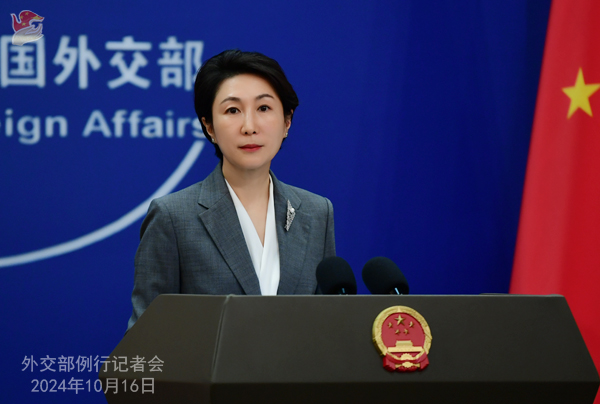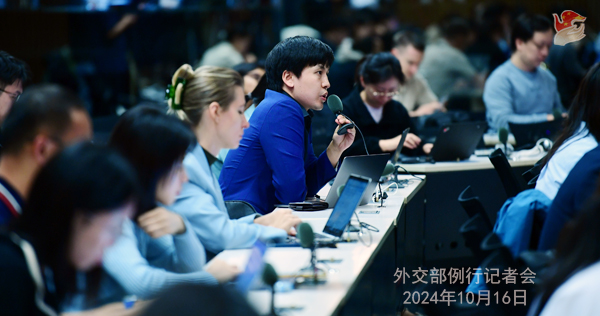Xinhua News Agency: From October 14 to 16, Premier Li Qiang traveled to Pakistan to attend the 23rd Meeting of the Council of Heads of Government of Member States of the Shanghai Cooperation Organization and paid an official visit to Pakistan. Could you share with us the details and major outcomes of the visit?
Mao Ning: China and Pakistan are all-weather strategic cooperative partners and iron-clad friends. This is the second visit of China’s Premier of the State Council to Pakistan in 11 years and marks an exchange of visits at the head-of-government level between the two countries within a year. Premier Li Qiang had in-depth discussions with the leaders from the Pakistani government, national assembly, and military. Let me share with you the positive outcomes in the following three areas.
First, consolidating all-weather friendship between China and Pakistan. Both sides shared the view that the iron-clad friendship has stood the test of time and gained renewed vigor, and under the strategic guidance of the leaders of the two countries, bilateral relations share sound momentum of growth. China reaffirmed that it prioritizes its relations with Pakistan in its foreign policy. Pakistan stressed that its relationship with China is the cornerstone of its foreign policy and its friendship with China is an overwhelming consensus recognized by all sectors in Pakistan. Both sides agreed to continue firmly supporting each other’s core interests, enhance high-level exchanges, jointly strive for respective modernization and national rejuvenation, and speed up the building of a closer China-Pakistan community with a shared future in the new era.
Second, deepening practical cooperation in various fields. Both sides agreed to foster synergy of development strategies, jointly upgrade China-Pakistan Economic Corridor (CPEC), accelerate the building of railway, highway, port and other major projects, step up the integrated development of industries, and deepen practical cooperation in such areas as agriculture, minerals, information technology, energy, economic exchange and trade, and people-to-people and cultural exchange so as to benefit more people in the two countries through bilateral cooperation. During the visit to Pakistan, leaders of the two countries attended the completion ceremony of the New Gwadar International Airport. Relevant departments of both sides signed the documents covering cooperation on CPEC, people’s livelihoods, science and technology, TV programs, quarantine and inspection, etc.
Third, ensuring a safe environment for cooperation. Pakistan expressed deep condolences over Chinese victims whose lives were taken in a recent terrorist attack and vowed to do everything it could to nail down the perpetrators and combat terrorism. Pakistan will also step up security measures, and fully ensure the security and safety of Chinese personnel, projects and institutions in Pakistan. China supports Pakistan’s efforts to fight terrorism and has asked Pakistan to take targeted security measures and create a safe environment for bilateral cooperation. Both sides reaffirmed their zero-tolerance approach against terrorism and readiness to increase bilateral and multilateral counterterrorism cooperation, form a synergy on counterterrorism regionally and internationally and jointly keep the region peaceful and stable.
Reuters: In the Joint Statement between the Islamic Republic of Pakistan and the People’s Republic of China that you mentioned, the two countries laid emphasis on strengthening security measures, including targeted measures. To be specific, what new measures or projects will China implement to this end? Will China fund or directly engage the effort to beef up security in Pakistan? If so, could you share more details?
Mao Ning: During Premier Li Qiang’s visit to Pakistan, the Pakistani side promised to firmly enhance security input, strengthen security measures, and ensure the safety and security of Chinese personnel, projects and institutions in Pakistan. China firmly supports Pakistan in fighting terrorism, and stands ready to help Pakistan enhance its counterterrorism capacity building and work with Pakistan to create a safe environment for cooperation between the two countries.
AFP: An annual report on internet freedom was released today by US-based research group Freedom House. The report found that internet freedom has fallen globally for the 14th straight year. China and Myanmar have a low level of internet freedom. Did the Foreign Ministry see this report and does it have any comment?
Mao Ning: Let me stress that China is a country that upholds the rule of law and Chinese citizens enjoy various rights and freedoms in accordance with the law. The institution that you mentioned has long made groundless remarks on China-related issues, and the so-called report is ill-motivated.
China News Service: On October 16, 1964, when China successfully detonated its first atomic bomb, China immediately declared that it would follow a policy of “no first use” of nuclear weapons. We noted that not long ago, during the review process of the Treaty on the Non-Proliferation of Nuclear Weapons (NPT), the Chinese delegation called for efforts from nuclear-weapons states to negotiate and conclude a treaty on mutual no-first-use of nuclear weapons. Do you have any comment on that?
Mao Ning: On October 16, 1964, the Chinese government made a solemn declaration to the world that it undertakes not to be the first to use nuclear weapons at any time and under any circumstances. History and reality have proved that no-first-use of nuclear weapons is conducive to enhancing strategic mutual trust, advancing the nuclear disarmament process, effectively reducing strategic risks, and promoting global strategic balance and stability.
Over the past six decades, the no-first-use policy has been increasingly becoming an important consensus and priority in the field of international arms control. This year, China submitted a working paper on mutual no-first-use of nuclear weapons at the Second Session of the Preparatory Committee for the 11th NPT Review Conference. China stands ready to work with other parties to continuously strive toward the goal of complete prohibition and thorough destruction of nuclear weapons, and the ultimate realization of a world free of nuclear weapons.

Sky News: Has China restricted exports of certain critical minerals as part of a trade competition with the US after the US restricted access to its advanced technology?
Mao Ning: I’d refer you to competent authorities on anything specific. Let me say that China stays committed to keeping global supply and industrial chains stable and secure, and applies fair, reasonable and non-discriminatory export control measures.
Nikkei: It has been almost a month since the stabbing of a Japanese elementary student in Shenzhen. Is there any progress in the investigation? Could you provide the latest information, including the motives of the assailant?
Mao Ning: As far as I know, China’s public security authorities are handling the case in accordance with the law. I’d refer you to the competent authorities for anything specific.
Beijing Youth Daily: Today marks the World Food Day, and this year’s theme is “Right to foods for a better life and a better future.” In recent years, due to the impact of regional conflicts, climate change, the sluggish economy and other factors, the issue of food security has been haunting the world. How do you assess China’s effort in safeguarding global food security?
Mao Ning: As the world’s largest food producer, China grows a quarter of the world’s food with less than 9 percent of the world’s arable land and feeds 1.4 billion people.
China attaches great importance to global food security. In recent years we have been providing emergency food assistance to countries who suffered from natural disasters and humanitarian crises, and actively sharing agricultural know-how and technologies to help developing countries enhance food production capability. China has provided more funding and experts and undertaken more projects than any other developing country under the framework of the Food and Agriculture Organization’s South-South Cooperation Programme.
Food security is listed as one of the eight priority areas of cooperation in the Global Development Initiative. China stands ready to work with all sides to enhance food security cooperation and strive for a world free of hunger.
AFP: Sources have told AFP that Myanmar chief Min Aung Hlaing will travel to China next month. This trip, the sources say, has been planned since Foreign Minister Wang Yi’s visit to Myanmar in August. Can you confirm that this visit to China is being planned or provide any further details?
Mao Ning: On this question, I have no information to offer at the moment.
Sky News: What are the reasons China introduced these export restrictions on gallium, germanium and antimony and some technology related to it?
Mao Ning: In August, the Ministry of Commerce and the General Administration of Customs jointly issued an announcement on this issue, which you may refer to.
NHK: A report released by the US Center for Strategic and International Studies on October 15 said that next year Beijing could use the 20th anniversary of its Anti-Secession Law to revise the law and justify Taiwan’s unification through military means. Do you have any comment on that?
Mao Ning: The Taiwan question is China’s internal affair that brooks no external interference.

Related Posts
Arrival Statement by H.E. Li Qiang, Premier of China in Pakistan

















